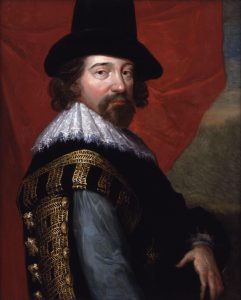Philosopher and political figure. Bacon's philosophical writings have been widely credited with launching empiricism, induction, and indirectly, the scientific revolution. This is exaggerated. Others such as Harvey seem to have had a better grasp of rudimentary science. But Bacon was a brilliant essayist and deservedly influential. His political as opposed to philosophical career was more of an object lesson than a beacon light for values. After successfully abandoning and then prosecuting his former patron, Lord Essex, for treason against Queen Elizabeth, his previously stalled political career took off. He held many important posts under King James I including the position of Lord Chancellor, and was made a peer as Lord Verulam. However, nemesis struck, he was convicted of taking large bribes, and never regained office.
